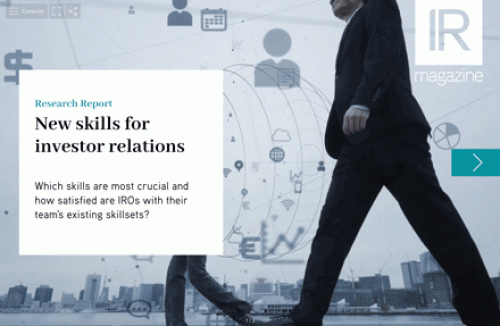FTSE 150 IROs have growing influence and stronger engagement with executive committee
A new study by recruitment firm Korn Ferry reveals that IR professionals are gaining stature within UK blue chips, with companies increasingly requiring strategic input and robust financial skills from their IROs.
A survey of 32 IROs from FTSE 150 companies finds there is a high level of turnover in the IR role, with more than half of respondents serving in their current role for two years or less and a majority of them joining from another firm.
Moreover, having experience of different sectors is valued by hiring companies. Almost half of respondents had served in more than one industry, and one fifth of them in three or more sectors, the study notes. ‘In many cases, we find technical IR skills can be transferred across industries and that the broad perspective gained in multiple sectors is often beneficial,’ comments Andrew Lowe, principal at Korn Ferry.
Unsurprisingly, an increasing number of IROs have a background in financial services ‒ including equity research and corporate finance ‒ with nearly a third coming from investment banking and a quarter holding the chartered accountant qualification. All survey respondents believe the IR function is valued either moderately or highly by their firm, though only a third are reportedly members of the executive committee; the remaining two thirds attend meetings when appropriate.
Budgets, however, don’t reflect the higher demands firms place on their IR heads. Two thirds of IR teams have seen their resources stay flat, with a quarter reporting a decrease in resources allocated to IR. Only half of IROs believe their compensation is in line with the ‘additional responsibilities and value in their role’.
The study also reports the key requirements FTSE IROs expect from their job: they must have direct exposure to and support from the CEO and CFO; they want latitude in creating and executing the IR program; the role must have scope for progression, including additional responsibilities such as corporate communications or corporate affairs; and relationships with the communications team as well as business unit leaders should be efficient.
IR remains very much rooted in the finance division, with three quarters of respondents reporting to the CFO and 9 percent each reporting to the CEO and the head of corporate communications or corporate affairs. It therefore comes as no surprise that 16 percent of IROs surveyed are aiming for a CFO role, with only 9 percent seeking to be head of corporate communications or corporate affairs.
‘It’s a good time to be in investor relations,’ Lowe concludes. ‘Our research reveals a significant shift in IR leadership, with increasing demand for broader experience and increased stature at the most senior levels of companies. The head of IR role is a useful development posting for potential CFOs.’










